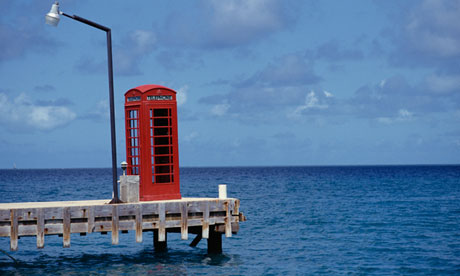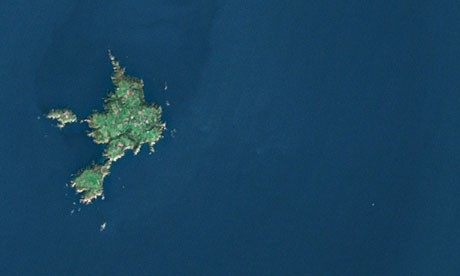Britain's relationship with its overseas territories means it could – if it wanted – easily tackle offshore global secrecy

'The British Virgin
Islands are perhaps rivalled only by Switzerland as a global capital for
the offshore industry'. Photograph: James Marshall/Corbis
It's a tumultuous time for the offshore industry. For decades,
there's been an uneasy equilibrium: opprobrium from campaigners, torpor
from regulators, apathy from the wider public, and delight for the
wealthy benefiting from the arrangements to cut their tax bill or avoid
regulatory scrutiny.
Recently, though, the rhetoric and action have changed. In tougher economic times – for which the financial sector has copped a huge amount of the blame – the public is more aggrieved by tax avoidance arrangements than ever, while recent proposed offshore crackdowns have been cautiously welcomed by campaigners as having the potential to actually be effective.
The leaking of more than 2m offshore files to the International Consortium of Investigative Journalists, and through them to the Guardian for our Offshore Secrets stories is just the latest in a series of unwelcome developments.
Amid this backdrop, and with ministers from George Osborne to Vince Cable willing to speak out strongly against offshoring and tax avoidance, it's easy to imagine the villains of the piece to be irresponsible foreign nations – happy to shelter the mega-rich in offshore secrecy, unconcerned about the tax avoided in other, larger countries.
If only the British government can prevail in these overseas battles, things will get better, it seems.
But such a stance ignores that one nation in particular has ties to offshore havens everywhere. It's a veritable nexus of offshore influence, related to havens in the Caribbean, and much closer to home. That nation is, of course, the United Kingdom.
The clue is quite often in the name. The British Virgin Islands are perhaps rivalled only by Switzerland as a global capital for the offshore industry, with more than 1m offshore companies registered on the Caribbean island (population 31,900). Plaques for registration agents, solicitors and more line almost every wall of the islands' tiny capital.
The islands are a British Overseas Territory: legally under the jurisdiction of the UK (and with a British governor), but in practice self-governed. Other havens with this UK imprimatur include the Cayman islands, Gibraltar, and the Turks and Caicos Islands.
Closer to home, the UK wields even more control over the crown dependencies: Jersey, Guernsey and the Isle of Man, whose role in legal tax avoidance techniques has been documented time and again for decades.
Even within the UK itself, little is done against tricks of the offshore trade that have been known for decades.
In 1999, Sark islander Philip Croshaw was struck off as a UK director for acting as a "nominee" – a sham director who hides a company's real controllers – for thousands of companies in the UK.
At the time, then-trade minister Kim Howells said: "The government today struck a fatal blow against the practice of so-called 'nominee directorships' … The trade in providing 'nominee director' services from the island of Sark has been a scandal … The courts have now effectively outlawed this abuse."
And yet today – 14 years later – more than 175,000 UK companies have had directors based in offshore havens, and the Guardian has identified 28 sham directors with tens of thousands of companies between them.
In short, a huge string of the world's foremost offshore havens have, at minimum, a strong and long-lasting symbolic relationship with the UK, and in practice are susceptible to significant influence and pressure from the UK government.
Even at home, offshore practices known and deplored by governments for more than a decade are still going strong. The temptation for campaigners and government alike is to look overseas for the villains in the offshore trade. The reality is more complex, and the trouble closer to home. The upside of this is it means that if Britain really wants to tackle global offshore secrecy, there's a lot it can do.
But so far, everywhere – on its home turf, in its dependencies, and in its overseas territories – the UK brand is on both sides of the fight. For Britain, the battle against offshore tax havens – if it wants to fight it – begins at home.
Recently, though, the rhetoric and action have changed. In tougher economic times – for which the financial sector has copped a huge amount of the blame – the public is more aggrieved by tax avoidance arrangements than ever, while recent proposed offshore crackdowns have been cautiously welcomed by campaigners as having the potential to actually be effective.
The leaking of more than 2m offshore files to the International Consortium of Investigative Journalists, and through them to the Guardian for our Offshore Secrets stories is just the latest in a series of unwelcome developments.
Amid this backdrop, and with ministers from George Osborne to Vince Cable willing to speak out strongly against offshoring and tax avoidance, it's easy to imagine the villains of the piece to be irresponsible foreign nations – happy to shelter the mega-rich in offshore secrecy, unconcerned about the tax avoided in other, larger countries.
If only the British government can prevail in these overseas battles, things will get better, it seems.
But such a stance ignores that one nation in particular has ties to offshore havens everywhere. It's a veritable nexus of offshore influence, related to havens in the Caribbean, and much closer to home. That nation is, of course, the United Kingdom.
The clue is quite often in the name. The British Virgin Islands are perhaps rivalled only by Switzerland as a global capital for the offshore industry, with more than 1m offshore companies registered on the Caribbean island (population 31,900). Plaques for registration agents, solicitors and more line almost every wall of the islands' tiny capital.
The islands are a British Overseas Territory: legally under the jurisdiction of the UK (and with a British governor), but in practice self-governed. Other havens with this UK imprimatur include the Cayman islands, Gibraltar, and the Turks and Caicos Islands.
Closer to home, the UK wields even more control over the crown dependencies: Jersey, Guernsey and the Isle of Man, whose role in legal tax avoidance techniques has been documented time and again for decades.
Even within the UK itself, little is done against tricks of the offshore trade that have been known for decades.
In 1999, Sark islander Philip Croshaw was struck off as a UK director for acting as a "nominee" – a sham director who hides a company's real controllers – for thousands of companies in the UK.
At the time, then-trade minister Kim Howells said: "The government today struck a fatal blow against the practice of so-called 'nominee directorships' … The trade in providing 'nominee director' services from the island of Sark has been a scandal … The courts have now effectively outlawed this abuse."
And yet today – 14 years later – more than 175,000 UK companies have had directors based in offshore havens, and the Guardian has identified 28 sham directors with tens of thousands of companies between them.
In short, a huge string of the world's foremost offshore havens have, at minimum, a strong and long-lasting symbolic relationship with the UK, and in practice are susceptible to significant influence and pressure from the UK government.
Even at home, offshore practices known and deplored by governments for more than a decade are still going strong. The temptation for campaigners and government alike is to look overseas for the villains in the offshore trade. The reality is more complex, and the trouble closer to home. The upside of this is it means that if Britain really wants to tackle global offshore secrecy, there's a lot it can do.
But so far, everywhere – on its home turf, in its dependencies, and in its overseas territories – the UK brand is on both sides of the fight. For Britain, the battle against offshore tax havens – if it wants to fight it – begins at home.

